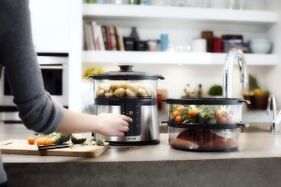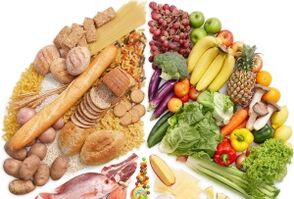Does prostatitis require diet?
- The inflamed organ increases in size and compresses the urethra, making urination difficult;
- For the same reason, bowel function becomes difficult, leading to constipation;
- With acute inflammation, the prostate can be extremely painful and cause severe discomfort;
- If contagious, this organ can become a focal point for disease transmission and lead to systemic poisoning;
- Increased organ size puts pressure on blood vessels and blocks lymphatic drainage, causing blood to stagnate. Not only does this severely exacerbate the problem, but it can also lead to other disturbances in the function of the pelvic organs;
- The prostate stops producing the required quantity and quality of secretions. Therefore, sperm will soon die in an unsuitable environment, and men lose the ability to fertilize;
- Inflammation makes the discharge difficult to clear, making the ejaculation process itself nearly impossible and leading to impotence.
Therefore, food has a direct effect on the stomach, since some components of food strongly irritate the mucous membrane, while others do not. Urine has a huge influence on the condition of the bladder: its function depends on its composition.

dietary goals
- The main goal of the diet is to reduce irritation. The latter is ensured by eating foods that affect the gastrointestinal tract (from the stomach to the intestines). In fact, this organ is so close to the intestine that when the intestine becomes irritated and inflamed, it becomes inflamed as well.
There are many reasons for poor gut health. For example, carbonated water can negatively affect the prostate by irritating the mucous membranes of all organs of the gastrointestinal tract. Smoky, salty, and spicy foods can also greatly irritate the intestines. Additionally, bacon and salty meats make working harder, which in itself can lead to constipation. - Blood Composition – Digested food ultimately results in changes in composition. If the blood contains irritating ingredients, this will have the greatest negative impact on the prostate. For example: the breakdown of aldehydes after drinking alcohol can significantly increase inflammation.
Normalization of blood flow - Due to squeezing of blood vessels, the blood supply process to the organ has been disrupted. Stagnation of the blood can significantly worsen the patient's condition. A diet containing easily digestible foods helps normalize blood circulation. - The composition of urine can improve or worsen the condition of the prostate. The patient's daily diet should include at least 2 liters of clean water or weak tea. In this way, the concentration of salt in the urine will decrease. As a result, urine stops irritating the genitourinary organs.
Patients with increased nocturnal diuresis view this recommendation negatively. In this case, it is recommended to drink more water in the morning and limit it in the evening. It is impossible to reduce the total amount of fluid: concentrated urine greatly irritates the prostate, causing pain. - Provide adequate nutrition – To restore organ and immune system function, adequate protein and vitamins are needed. Diets must be designed to meet this need.
Usually, for prostatitis, doctors will prescribe Diet Table No. 5. It is intended to protect the liver but is suitable for almost any gastrointestinal or genitourinary disease in which the normal functioning of the body's biliary system is important.

The basic principle
- Adequate protein and carbohydrate content. The standard for the former is 1. 5 grams per 1 kilogram of body weight or at least 1 gram per 1 kilogram of body weight. Carbohydrate content is calculated based on physical activity. It is important not to exceed this value, as excess glucose in the blood is an irritant;
- Fat content is limited, especially from animal sources. They complicate and slow down digestion, which is unacceptable when the prostate is inflamed;
- Cooking methods include stewing, boiling, steaming, etc. This maintains the maximum nutritional value of the product without allowing excessive fat content. It is strictly forbidden to fry flour and vegetables - this combination greatly irritates the intestines;
- Any food containing high purines or oxalates is not allowed. The same restrictions apply to spicy foods and seasonings—garlic, onions;
- Eliminate products that can cause fermentation and gas formation in the gut—from beans to carbonated water;
- It is necessary to limit the amount of salt used - no more than 10 grams, and this includes not only the salt itself, but also its content in cooked food. It causes fluid retention in the body, which leads to increased salt concentrations in the urine, which is a strong irritant;
- Stimulants - coffee, strong tea, cocoa and chocolate - are prohibited. Stimulants can be used in small amounts during the remission period;
- Be sure to prepare plenty of liquids - water, rosehip and chamomile soup, juice diluted with water, very weak lemon tea.
It is sometimes difficult for the body to switch to new nutritional methods. The trial period is considered to be 5 days. If during this period no adverse reactions - dyspepsia, intestinal fermentation - continue the diet until complete recovery or relief.
disease menu
- Breakfast: steamed meatballs, buckwheat or semolina porridge, light tea. During the remission of chronic prostatitis, you can drink a cup of coffee.
- Second breakfast: dried fruit, apples or sweet berries. Fruits and berries are recommended only when very ripe and preferably baked or in the form of purees and jellies. You can supplement your diet with bananas.
For chronic prostatitis, you can eat watermelon - no more than 2 a day, melon and pineapple, but only as part of a salad. - Lunch: vegetable soup, lean meat rolls, dried fruits. During remission, you can consume light broths and soups based on them.
- Afternoon snack: rosehip soup, biscuits. Turkish delight and even marshmallows are allowed, but only in long form and in small quantities.
- Dinner - vegetable steak, tea, biscuits.
- Breakfast: cottage cheese with a little honey, oatmeal or buckwheat, cooked in a mixture of 50% water and 50% milk. You can drink milk porridge during the remission period.
- Second breakfast: baked apples, optionally with honey.
- Lunch: vegetable oil soup, boiled chicken, rice. Dried fruit preserves.
- Afternoon snack: Rosehip and Chamomile Soup. If your condition is stable, you can eat fresh fruits or berries. You can also drink freshly squeezed juice. If the condition worsens, the juice must be diluted with water.
- Dinner: boiled fish, mashed potatoes, tea.
Allowed and prohibited products
| Name | Authorized products | Disable product |
|---|---|---|
| drinks |
|
|
| Soup |
|
|
| porridge |
|
|
| spaghetti |
|
|
| meat fish |
|
|
| bread |
|
|
| fruits and berries |
|
|
| Egg | Boiled or fried eggs, no more than 2. sky | Fried egg dishes |
| Oil |
|
|
| Sauces and Condiments |
|
|
| Sweet |
|
|
| dairy |
|
|
| vegetable |
|
|
Nutrition after recovery
However, healing, especially transitioning into remission, does not mean that you can immediately return to your normal diet, especially if this is a return to eating harmful foods.
- Broths are introduced first as they are easy to digest.
- Lean pork and beef are added, along with fattier fish, especially salmon.
- The range of vegetables allowed to be grown is being expanded - eggplant, spinach, tomatoes. Fresh fruit and berries are also added, but only sweet.
- Among baked goods, the most accepted ones are biscuits containing various additives.
- Beans are also added - beans, peas, but very slowly. The same goes for mushrooms.
- The sauces are introduced one by one. However, you should always give up mayonnaise.
- Drink alcohol in moderation – 2 glasses of wine, 1 shot of vodka per day.
- You can add different types of cheese, including spicy cheeses.
- If people really couldn't tolerate the absence of coffee, they would start drinking it. A maximum of 1 cup of espresso per day is allowed.
- The situation with chocolate and cocoa is difficult. If it is difficult to give up forever, then add such products last, starting with simple cocoa with milk.
- Carbonated drinks are prohibited with rare exceptions.
- Fried items were introduced last and in limited quantities.
- The ban on smoked and salted fish and meat will remain in place forever.






























